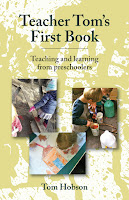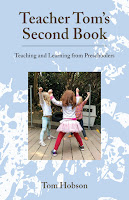I was recently talking with the person responsible for hiring educators for a large regional chain of preschools. Altogether they employ some 300 teachers. With the school year on the verge of starting they still had 45 vacant positions with few prospects in the pipeline.
I asked the logical question one asks in a capitalistic society, "Have you offered more money?" She had. Indeed, she was offering more money than some of the current teachers were making, which had her worried that should the word get out, everyone would legitimately want raises. And word would get out, she knew that, which would mean raising tuition, and that would be a hardship for some of the families, many of whom had no other choice because even before the pandemic there weren't enough available child care and preschool slots to meet demand.
This is the story of our profession in the US right now. We're not the only sector struggling to fill vacancies, but our situation has been brewing for a lot longer than the pandemic. Around here, parents are paying as much as $2500 a month per kid, which is a big hit for most middle class families, let alone families with lower incomes. If you have more than one kid, it often takes an entire adult salary just to afford child care. Between this and the pandemic, no wonder so many parents are opting to keep their children home, at least for the time being, and not rush back into the workforce.
The famous "invisible hand" of the marketplace is not working here. Economists tell us that when demand is high and supply is low, prices will rise until a kind of balance is reached. This should mean that educators, who are in demand everywhere, should be able to command substantial raises, yet the typical annual income for a child care or preschool teacher in our state remains stuck at under $30,000 per year, not a livable wage. For wages to increase as our economic theory says they should, centers and schools would have to dramatically raise tuitions, but that would then price many of their customers out of the market. So they stay home while employers in other sectors gripe about all the unfilled jobs they have, blaming it on workers who have grown "lazy" on the "government" dole. Their solution, of course, is simply to take away any support these families have, which will leave them no choice but to come crawling back to the low wage jobs. But what are they going to do with their kids? Well, the government will have to subsidize . . . .
It's a mess. It is a mess made by applying the principles of capitalism where they don't belong. Caring for children, whether we acknowledge it or not, is the primary purpose of every human society. Throughout most of human history we understood this. Children stood at the center of every one of the so-called "hunter-gatherer" societies that have ever existed, which is how we lived for at least 90 percent of our time on the planet. Even as we moved into more agricultural societies, children and adults spent their days living and working together. It was the mental experiment of the "invisible hand," as proposed by the Scottish economist Adam Smith, that in many ways spurred the Industrial Revolution and the ultimate removal of children from the center of life.
I assert that most of our world's problems come from this removal of children from the center of life. As any of us know who work with young children, they have a vital role to play. For one thing, 98 percent of five-year-olds tested by NASA were found to be "creative geniuses" while only 2 percent of adults fit that category. Living and working amongst geniuses inspires everyone's thinking. No wonder it seems that we're incapable of thinking our way out of our problems.
When children are removed from the equation, it's too easy to lose our way and begin to believe that money, not caring for others, is our highest pursuit. No wonder so many of us feel that it's all a rat race and try to satisfy ourselves with more, more, more.
As Iris Murdoch writes, "Any trouble with money confuses the mind." Young children do not care about money, at least not in the way adults do, and their indifference reminds us that we have more important things to do, like caring for the children. They remind us that there are an infinite number of possibilities open to the spirit.
It seems to me that the first employer who figures this out will be the winner, not just in the game of capitalism, but in life itself. What if parents could bring their children to work with them? What if instead of lobbying to make prospective employees so destitute that they are forced to take crap jobs, they opened their arms to families, providing high quality on-site childcare right there in the same building? What if parents could lunch with their children? What if every employee, parent or not, was required to take their turn in the nursery amongst the geniuses? What if everyone from the CEO to the custodians spent time together on their knees with the children? I have no way of proving this, but in my mental experiments (which are at least as valid as Adam Smith's) you would wind up with people who are more creative, more motivated, more capable of working together, and happier. I imagine turn-over would be greatly reduced and loyalty greatly increased. This is the dream of every HR department everywhere.
This is why I remain dubious about efforts in our country to fund universal child care as a government function. In the proposals I've seen, we would merely perpetuate the separation of children from society, isolating them in pink collar ghettos while their parents spend their days in unnatural child-free zones.
The primary purpose of every society is to care for the children. That is where our humanity lies, not with the invisible hand.
******
If you liked reading this post, you might also enjoy one of my books. To find out more, Click here! "Teacher Tom, our caped hero of all things righteous in the early childhood world, inspires us to be heroic in our own work with young children, and reminds us that it is the children who are the heroes of the story as they embark on adventures of discovery, wonder, democracy, and play." ~Rusty Keeler
I put a lot of time and effort into this blog. If you'd like to support me please consider a small contribution to the cause. Thank you!











